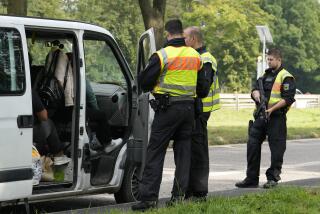EU expands free-travel zone in step toward borderless Europe
- Share via
BERLIN — Europe edged a step closer to full integration today with the removal of many of the region’s last internal border posts, a move that will entrust the European Union’s nine newest members with policing its eastern frontiers.
With a series of ceremonies across the continent, the nine countries on the EU’s eastern edge that joined the union in 2004 will take primary responsibility for screening many arrivals. European residents will be able to traverse most of the continent by road or sea without showing a passport or national ID card.
The expansion across most of Europe of the so-called Schengen zone is a move toward a borderless Europe, a long-held goal of many leaders.
“I can define this as an historic event. Now, after the enlargement in 2004 we are granting European citizens from the new nine member states new freedom of movement, without controls, without showing passports,” Franco Frattini, EU commissioner for freedom, justice and security, said in a telephone interview.
“European citizens will be able to go from Lisbon to Tallinn [Estonia] without showing passports, and that is in itself a very great achievement. It is one of the pillars of European citizenship,” he said.
The free-travel area expanded to 24 countries with the addition of Estonia, the Czech Republic, Lithuania, Hungary, Latvia, Malta, Poland, Slovakia and Slovenia, bringing a total of 400 million Europeans into the border-free zone.
Britain and Ireland, two EU members that opted out of the Schengen zone, say they prefer to keep control of their borders.
While citizens from those nine new countries already were able to freely enter any EU country, the new system ends often-lengthy delays at the borders and makes it easier for non-EU citizens to travel across Europe.
“Krakow, Prague and Budapest have come closer,” Berlin’s Tagesspiegel declared Thursday. “But mainly: The Iron Curtain has finally fallen.”
The move has caused uneasiness in some countries, where there is skepticism that the new border states, primarily Poland, Slovakia and Hungary, are up to providing Europe’s front line of defense against illegal immigration, drug and human trafficking, smuggling and terrorism.
“For us, the opening of the border comes too soon,” said Josef Scheuring, a spokesman for Germany’s border police officers within the police trade union in the Brandenburg border region.
The state of Brandenburg shares a 120-mile border with Poland, and nearly 400 police officers there marched Nov. 22 in a demonstration against the new regime. Scheuring said the number of border officers in the state will be reduced from 1,600 to 800, though there is not yet full communications integration with the Polish border guards.
“We contend that the border police should stay with its full staff in the border region until we have secured analysis about the potential increase in crimes,” Scheuring said. There already has been a significant increase in drug trafficking along the border, even with German border stations fully staffed, he said.
“Mayors of border towns are concerned that gangs will cross the border without being checked, commit crimes in eastern Germany and then vanish back,” Sebastian Edathy, head of the German parliament’s committee for internal affairs, told the Mitteldeutsche Zeitung newspaper.
Nations in the Schengen zone have access to a computerized network that alerts them when someone has been refused entrance. A major upgrade of the system is scheduled to be completed next year.
Officials in the nine new member states say they have completed a rigorous, $1.4-billion upgrade of their border controls that includes new fencing, patrol vehicles, computer systems, personnel and training.
Andrzej Gras, an advisor in Poland’s office for European integration, said his country received a positive report in a recent international evaluation of controls on its eastern border.
“Some of the members of the committee said the Polish eastern border is better secured now than the German border was when the Schengen system started in Germany 12 years ago,” Gras said.
But with the new free travel provisions, he said, all countries of the EU will have to enforce their own regulations on employment. The new provisions do not remove individual nations’ controls on who may live and work within their borders. Although EU citizens may freely travel to other member nations, they generally may not stay longer than 90 days without obtaining a residence or work permit.
About 1 million Poles have emigrated for jobs since their nation joined the EU in 2004. Gras said many of them work illegally in Berlin, which is within commuting distance of the Polish border.
Removal of the border posts could encourage more to make the short trip. Officials acknowledge that it also may be more difficult to prevent illegal migrants from Russia, Ukraine, Belarus or elsewhere who enter through Poland or across the mountainous border in Slovakia from traveling onward throughout the EU.
But the expense of traveling to Germany or France probably will limit the number of illegal workers there, Gras said.
“Competition will increase, no doubt. If you listen around on Berlin construction sites, the majority already speak Slavic languages,” said Gerhard Meckel, a roofer in Berlin. Yet so far, there has been plenty of work to go around, he said.
“My order books are full at the moment, thank God,” he said. “However, I don’t know what happens when recession comes back.”
--
Retzlaff reported from Berlin and Murphy from London.
More to Read
Sign up for Essential California
The most important California stories and recommendations in your inbox every morning.
You may occasionally receive promotional content from the Los Angeles Times.










